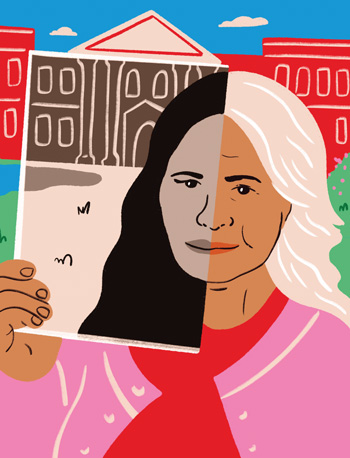
Illustrations by Sol Cotti
In February 2018, Joanne Rodríguez traveled to Pittsburgh to attend the 20th anniversary celebration of the Association of Theological Schools’ Women in Leadership initiative. The event drew nearly 200 women administrators and faculty members at theological schools, and it marked significant gains in women’s leadership and scholarship over the course of the initiative’s existence.
But Rodríguez, who serves as executive director of the Hispanic Theological Initiative (HTI), noticed something troubling as she studied the event program. In a list of over 160 women who had served as chief executive officers and chief academic officers at ATS member institutions since the 1970s, the first Latina dean didn’t appear until 2005. The second appeared in 2010, and the third in 2012. The first Latina president made the list in 2014, and another in 2017. That was it.
“These numbers were quite shocking to me,” Rodríguez said. During the event she listened as speakers dug into the data and pointed out how the advancement of women in these leadership roles had slowed across the board in recent years. But as the leader of HTI, and as a Latina herself, she was especially concerned with the lack of Latina representation in the top ranks of school leadership. This event sparked something in Rodríguez, and she began to seriously consider how HTI could help change the situation.
“I thought about it a lot, shared it with my steering committee,” she told In Trust Center President Amy Kardash in episode 14 of the center’s Good Governance podcast. By the following year, HTI had developed a leadership program proposal to bring bivocational, entrepreneurial, and mid-level career Latinas in religion and theological education en conjunto (into collaborative togetherness) to “develop the skills needed to create sustainable practices that will carry and advance them through their careers.” Lilly Endowment Inc. supported the program with funding, and Rodríguez and her team selected the first cohort of seven participants for HTI’s Latinas in Leadership program (HTI-LIL) along with seven “sages” — Latinas who have had significant leadership positions and could offer perspective, resources, and mentorship to their younger counterparts. (While the program currently has an equal number of participants and sages, they are not paired off. “We didn’t want to be too restrictive,” Rodríguez said. “We realized each sage has a particular expertise, and we wanted everyone to be able to talk with everyone.”)
During the one-year program, participants meet virtually six to eight times to discuss topics such as building high-performing teams, effective management, conflict resolution, data analysis, and navigating institutional change. The program includes two in-person meetings at which each participant defines what holistic leadership means to her as she advances her career goals collaboratively with the mission of an organization. Participants also work with a certified executive coach to determine their leadership strengths, stresses, and approaches, and they create an individualized action plan, the Proyecto Vital, to “advance in their leadership goals in a sustainable, holistic, and viable way,” as the program’s website reads.
Although the pandemic delayed the initial in-person gathering, the group moved ahead with virtual meetings and was finally able to unite in person in March 2022 at a conference center near the HTI office at Princeton Theological Seminary.
“It was amazing,” said Wendy Arce, associate dean of students at Graduate Theological Union and one of the participants at the gathering. “It was wonderful to finally meet all of these women face to face, and to have this space to focus on professional development and leadership skills and wellness — it was the kind of experience that fed your whole being.”
Loida I. Martell, one of the sages for the first cohort, is vice president for academic affairs, dean and professor of constructive theology at Lexington Theological Seminary, where she has served since 2017. She immediately saw how the Latinas in Leadership program could fill a longstanding void. “We need mentors who can actively support Latinas, to help them identify their goals and the steps to achieve them, to ensure that they are not undervalued,” she said. “What stands out in my mind is the many times I was overlooked or discounted.”
Before Martell embarked on her academic career, she had honed her leadership and administrative skills as a veterinarian who managed her own clinic in Puerto Rico, and then as co-pastor of a large church in New York. She had experience chairing committees, managing budgets, and designing programs, but it was years before someone approached her at an ATS event and asked if she had ever considered being a dean.
When we think of leadership, we often think of someone who’s alone, someone who doesn’t make mistakes. BUT THAT’S A MYTH.

Illustrations by Sol Cotti
Many Latinas have had the dis- concerting experience of feeling invisible in theological education settings, as well as feeling overly, uncomfortably visible. Joanne Solis-Walker, associate dean and professor in the practice of leadership at Candler School of Theology and a HTI-LIL sage, explains how she has experienced it: “From my appearance, mannerisms and the way I communicate — when I walk in the room, you know I’m a Latina, and often the only one.” Even in settings where she feels welcomed and accepted, that comes with its own set of challenges. In those situations, she said, she has found herself “becoming the voice for diverse and multiple Latinx communities. Automatically I’m viewed as the expert [on ‘the Latinx experience’], which signals their need for greater cultural understanding.”
Both Martell and Solis-Walker found supporters and ad hoc guides as they advanced in their careers, but they lacked the structure of a formal mentorship program to address issues such as goal setting and connecting their leadership development to organizational objectives.
Martell hired an executive coach while she was in transition in her career — a decision she recommends to others, but one that she knows is financially out of reach for most early- and mid-career Latinas in academic leadership. “We have really needed a formal program that is intentionally geared to mentor Latinas into positions of academic leadership,” she said. And when she says “we,” she means Latinas — and she also means theological schools. As a chief academic officer, she knows that theological schools stand to benefit from more Latinas in leadership positions.
Unlocking the Performance Potential
“Taking action to close the Hispanic leadership gap is not just about leveling the playing field—it’s about unlocking the performance potential of a critical and growing segment of our society,” said Doris García Rivera, interim director of the Baptist Peace Fellowship of North America, former president of the Evangelical Seminary of Puerto Rico, and sage for HTI-LIL.
“Leading is a call and a commitment to move forward toward the wellness of all,” she continued. “I believe that ultimately leading is not about institutions but about triggering the potential of people.
That’s important in building relationships and managing alliances and new partners — high-priority tasks for leaders in theological education, especially now, as over a third of seminary graduates go on to jobs outside the church, and as schools are faced with the challenges of looking for new funding streams, new prospective student pools, and new ideas for the church, ministry, and theological education.
Candler’s Solis-Walker offers an example of what García Rivera means when she talks about unlocking the performance potential of a critical and growing segment of society.
“I’m a first-gen across the board,” she said. “Like many of my colegas, I was the first to graduate from college, earn a master’s, then my Ph.D. So, my family — my extended family, my church communities — they claimed ownership of my degrees. My caps and gowns inspired many others to pursue their own academic dreams.”
This experience rings true in her new role at Candler. “The encouragement and support of the Latinx church and Latinx theological community has always been significant but not as strong as it is now,” she said. “To see a Latina in an executive leadership role signals change. It conveys a message of hope for a more inclusive future, one that acknowledges the critical involvement of Latinx leaders. This is one of the many reasons why the HTI-LIL is so important.”
She said it also provides accountability as she has advanced into higher levels of leadership, “making sure that I continue to serve from the margins and that I am mindful of and advocate for the needs of our community.”

Illustrations by Sol Cotti
The Business Case and the Theological Case for Fostering Latina Leadership
A 2020 study by the IBM Institute for Business Value reports that Hispanic representation among corporate executives in the United States is just 4% — but that nearly 20% of U.S. residents are Latino, that Latinos are estimated to drive almost 25% of the country’s Gross Domestic Product growth, and that 60% of Hispanics in the U.S. are age 35 and younger.
According to the Institute’s research brief, Untapped Potential: The Hispanic Talent Advantage, “There is arguably no more compelling — or obvious — opportunity in the realm of human capital than the untapped talent of the Hispanic community in the United States.”
While the business case is strong, García Rivera offers a theological case that should impel schools as well. Before she became president of Evangelical Seminary of Puerto Rico, she was a missionary for over two decades, and that experience formed her thinking on interculturality.
“Interculturality, diversity, and equity are essential for any organization today,” she said. “And it goes beyond having Hispanic faculty or students, or having a Latina or any other minority in a leader position. Interculturality is a complete transformation of the institution to value and honor the differences that we all bring to the institution, and the richness that comes from our different experiences and way of understanding reality.”
Taken to its fullest actualization, she said, this is how she imagines the kingdom of God. In the here and now, though, she said diversifying boards, faculty, and staff is a step toward better reflecting the changing demographics of students, as well as a way to reach out to people and organizations outside the standard orbit of an institution. And, García Rivera said, Latinas who are recruited for the board or administrative leadership will “bring a different way of seeing reality that will complement, challenge, and enrich the path of the institution.”
What stands out in my mind is the many times I was overlooked or discounted.
A Word to the Wise
Naming a Latina to a top position is a move in the right direction, but it’s certainly not enough to solve problems alone. Indeed, García Rivera has seen situations where Latinas are brought in to “solve or save” an institution long riddled with problems.
“Without the needed support and trust from all stakeholders, this is a recipe for disaster for both the institution and the leader,” she said. “Latinas need to be seen as valid partners and as precious assets,” and they need to receive support, trust, and equitable and just pay. Securing the success of a Latina leader, García Rivera said, goes a long way to securing the success of the organization.
For participants in the LIL program, their meetings offer regular reminders of these principles. The gatherings provide a safe space to consider their own strengths and gifts and ways in which they need to grow. In other words, Wendy Arce of GTU said, they can just be themselves, talk candidly about their joys and challenges, and receive feedback and guidance from seasoned leaders who want to see their junior counterparts reach and then surpass their goals.
“When we think of leadership, we often think of someone who’s alone, someone who doesn’t make mistakes,” Arce said. “But that’s a myth. Having a system of support, having mentorship, and being able to create and build a network of trust is really important for all leaders.”
Doris García Rivera wholeheartedly agrees. “This Latinas in Leadership program is truly a game changer,” she said.
It’s one shortcoming is that it wasn’t around when she was embarking on her own career.
Sage Advice
Words of wisdom to Latinas considering leadership roles (from ones further along that path).
Know yourself.
Leadership is seated in who you are, what values you have, and how you interpret reality. Grow and polish the skills that you already have, skills like communication, listening, data analysis. These skills are essential for this type of work.
Find peers to accompany you. Leading has been for many a solitary endeavor, but we need trusted companions, mentors, confidants, good friends. Don’t walk this path alone.
Don’t take yourself too seriously. It’s OK to make mistakes as long as you learn from them.
—Doris García-Rivera,
interim executive director of Baptist Peace Fellowship of North America (BPFNA) and former president of Evangelical Seminary of Puerto Rico
Do not be disheartened, especially when you are treated as invisible.
Continue to dream. Exert leadership wherever you are. Seek allies and create friends. Seek out those who are leaders who can be mentors and provide information, wisdom, and advice.
When opportunities arise, apply, and do not second-guess yourself. If possible, get a coach to help you.
—Loida Martell,
vice president for academic affairs, dean and professor of constructive theology at Lexington Theological Seminary
Listen carefully to everybody, including your critics.
These individuals can see pitfalls and danger in the landscape and they can help you avoid a lot of problems.
Learn from everybody. People of all kinds and from all fields have something to teach you—sometimes wonderful, wise things that are applicable to the work that you do.
Finally, love. I’m not talking about sentimental love—I mean the type of love that, when there’s no hope, you show hope. When faith is out the window, you continue to imagine new possibilities. It’s the type of love that allows you to let go and grieve when things are not working, and allows you to celebrate when things do work.
—Joanne Rodríguez,
executive director of the Hispanic Theological Initiative
Don’t be afraid to lead from the margins.
Grow in your intercultural competence so you learn how to navigate the spaces God has called you to serve. Be a brave and bold Latina leader and when in doubt know many others will follow in your footsteps. ¡Mujer, confía que si se puede!
—Joanne Solis-Walker,
associate dean and professor in the practice of leadership at Candler School of Theology at Emory University